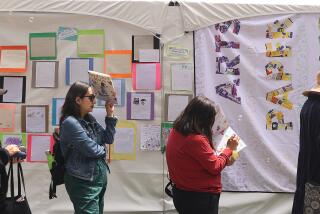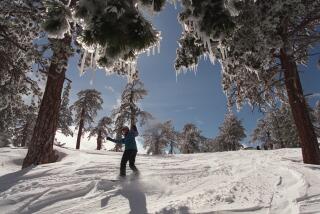Review: Robert Hass balances extremes in ‘Summer Snow’
“Summer Snow,” the first book of poems in nearly a decade by Robert Hass, is a volume of commemorations. I would use the word “elegy,” but Hass, who served as U.S. poet laureate from 1995 to 1997, is explicit in his distrust, or disavowal, of that idea.
“No metaphors yet / For my father-in-law,” he writes in “Poem Not an Elegy in a Season of Elegies.” “He still in my head belongs to being.”
The line is reminiscent of William Carlos Williams, who is also recollected in these pages: “No ideas but in things.” What Hass, like Williams, is evoking is a way of being — emotional, yes, but also physical, in which abstraction only distracts us from the substance of the world.
“[I]t is very good to be walking,” Hass observes in “Abbott’s Lagoon: October,” “Because you can almost hear the earth sigh / As it sucks up the rain.” Both the image and the poem’s title are as specific as the language in a field guide. (It’s no coincidence that “Field Guide” was the title of Hass’ debut collection, which won the Yale Series of Younger Poets Award in 1973.)
That’s because Hass’ work here is steeped, as it has been throughout his career, in such California landscapes as the Sierra mountains (“bare rock eroding in the sun,” he describes them) and the soft crumple of the East Bay hills. Born in San Francisco, he has taught for many years at UC Berkeley; one might say the state is in his blood.
“Towns on the Northern California coast are foggy in August / With shafts of startled sunlight sometimes in the afternoon,” he begins “Christmas in August,” which examines how time can be rendered opaque by a particular cast of mist or light.
The fog makes Hass think of Christmas, although again, it is not metaphor he is after but something sharper, a feeling and a form. “It was August,” he concludes, “the planet just turning toward the dark, / A long way and not a long way from the short, dark days / We gather to celebrate the light surviving through.”
This notion of survival — and of death, its necessary analogue — sits at the center of “Summer Snow,” which offers no illusions about the bittersweet consolations of looking back. “Christmas in August” goes on to remember an older man, “a refugee Professor from another generation” — Hass’s UC Berkeley colleague Czeslaw Milosz. For many years before Milosz’s death in 2004, the two collaborated on translations, and his fellow poet’s presence lingers in these verses like a specter or a soul.
In “An Argument About Poetics Imagined at Squaw Valley After a Night Walk Under the Mountain,” Hass refers to him directly. “My friend Czeslaw Milosz disapproved of surrealism,” he insists, reminding us of Milosz’s astonishing World War II poem “Campo dei Fiori,” with its shocking juxtaposition of a carousel in spring “[w]hile gunfire crackles on the other side of the ghetto wall.”
Hass’ language almost exactly echoes the original (“The bright melody drowned / the salvos from the ghetto wall,” Milosz wrote), but his intent is not ventriloquism or any other literary trick. Rather, he is seeking a more concrete connection, in which language, for a moment anyway, can capture the specifics of a situation, and in so doing, effect a kind of transference.
In “Summer Snow,” Haas also remembers other lost friends, including Stanley Kunitz, an important early mentor, as well as “Jane Kenyon, cancer at forty-seven. / Larry Levis, heart at forty-nine. Ray Carver / who had met Tess and beat alcohol which / was going to kill him, cancer at fifty.” The matter-of-factness only highlights the irretrievability of the loss.
At the same time, the collection’s title, with its balancing of extremes, suggests that larger complications and dichotomies are in play. Death, Hass is telling us, is a season, less the antithesis of life than its conclusion. The act of dying, in other words, is nothing special, nor even necessarily catastrophic — except, perhaps, for those who have been left behind.
“I believe,” he writes, “that death’s song is the color of wet violets, / Violets accustomed to the earth, / because the face of death is green / And the gaze of death is green / With the sharp wetness of the leaf of a violet / And its serious color of wintry impatience.” There it is, death as a part of nature, a season once more.
Ocean Vuong, bestselling author of “On Earth We’re Briefly Gorgeous,” joins the L.A. Times Book Club on Jan. 27.
“So there is writing and there are ideas about it,” Hass declares, again reflecting Williams, “and the world is full of rain, so many parts of it either tragic or brutal, any sense of responsibility to which would be a boundary as well as an entry.” What he is saying is that death, like nearly everything in this fallen world, can be read in a variety of ways.
Nowhere is this more vividly expressed than in “Patches of Snow in July,” a suite of poems that illuminates the tensions inherent in “Summer Snow.” First, of course, there is that title, which recalls both “Christmas in August” and the name of the collection. But even more, there are the poems, half a dozen of them, in which Hass audaciously takes us through a cycle of dying, from “Death in Infancy” to “Death in Childhood” to “Death in Adolescence,” before finishing with “Harvest: Those Who Die Early in Their Middle Years.”
I say “audaciously” because the sequence comes at the start of the collection and also because of the ruthless clarity of the poet’s eye. “And even death, / because it is terrible, does not taste terrible,” he acknowledges, describing how it felt to lose a young friend in his 20s. “Because / the first adult grief makes us feel adult.” The implication is that in surviving, the act of it, we cannot help but grow.
“Tomorrow,” Hass writes in the final lines of a poem memorializing Kunitz, “I’m / Going to hike to the waterfall / And listen to the sound of it.” The affirmation is as simple, and as necessary, as any I know. What it offers is a strategy for living. “Isn’t that, after all,” Hass asks us, “what a stanza is for?”
New Poems
Robert Hass
Ecco: 178 pages, $27.99
Ulin is a former book editor and book critic for The Times.
More to Read
Sign up for our Book Club newsletter
Get the latest news, events and more from the Los Angeles Times Book Club, and help us get L.A. reading and talking.
You may occasionally receive promotional content from the Los Angeles Times.







